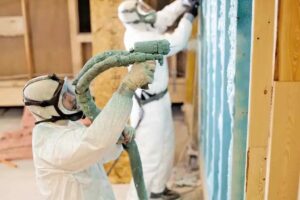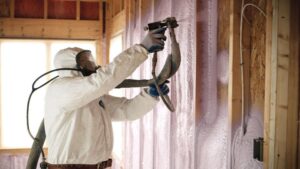Open-cell spray foam insulation in Crockett, Texas, has gained popularity due to its energy efficiency and air-sealing properties. However, misconceptions still surround this insulation type, leading to confusion among homeowners and business owners. To provide clarity, this article debunks five common myths about open-cell spray foam insulation services and explains why it remains a top choice for insulation solutions in the region.
Myth #1: Open-Cell Spray Foam Absorbs Too Much Moisture
Some believe that open-cell spray foam insulation soaks up water like a sponge, making it ineffective in humid climates.
Reality:
Open-cell spray foam has a high permeability rating, meaning it allows controlled moisture movement without trapping water inside walls. Unlike traditional insulation materials that can retain moisture and promote mold growth, open-cell spray foam dries out quickly, reducing the risk of water damage. In Crockett’s fluctuating climate, this property makes it an ideal choice for maintaining indoor air quality.
Myth #2: Open-Cell Spray Foam Insulation is Not as Effective as Closed-Cell
Many assume that open-cell spray foam is inferior to closed-cell spray foam because of its lower density.
Reality:
While closed-cell foam has a higher R-value per inch, open-cell spray foam provides superior air sealing. It expands more than closed-cell foam, filling hard-to-reach spaces and preventing air leakage. This ability to create a continuous air barrier significantly enhances energy efficiency, making it a smart option for homes and buildings in Crockett, Texas.
Myth #3: Open-Cell Spray Foam is Harmful to Indoor Air Quality
A common misconception is that open-cell spray foam insulation releases harmful chemicals into the air, leading to poor indoor air quality.
Reality:
When installed correctly by professionals, open-cell spray foam insulation is safe and does not release harmful emissions. Modern formulations contain low volatile organic compounds (VOCs), ensuring that indoor air remains clean and breathable. Additionally, its air-sealing properties reduce the infiltration of outdoor pollutants, enhancing indoor air quality in Crockett homes and businesses.
Myth #4: Open-Cell Spray Foam Breaks Down Over Time
Some believe that open-cell spray foam deteriorates faster than other insulation types, making it an unreliable choice.
Reality:
Open-cell spray foam is designed to last for decades. When installed properly, it maintains its structure and insulation performance over time. Unlike fiberglass batts, which can sag or shift, spray foam adheres firmly to surfaces, ensuring long-term energy efficiency. This durability makes it a cost-effective insulation solution for properties throughout Crockett.
Myth #5: Open-Cell Spray Foam Insulation is Too Expensive
There’s a perception that open-cell spray foam insulation is prohibitively expensive compared to traditional insulation materials.
Reality:
While the upfront cost of spray foam insulation may be higher than fiberglass or cellulose, it provides significant long-term savings on energy bills. By reducing heating and cooling costs, open-cell spray foam pays for itself over time. Additionally, many homeowners in Crockett find that its energy efficiency and durability make it a worthwhile investment.
Conclusion:
Debunking these myths highlights the benefits of open-cell spray foam insulation in Crockett, Texas, from superior air sealing to long-term energy savings. For homeowners and businesses in Crockett, Texas, choosing this insulation type means investing in comfort, efficiency, and indoor air quality.
Get Expert Open-Cell Spray Foam Insulation Services in Crockett, Texas
For professional installation and expert guidance, contact D&D Insulation LLC today at (903) 389-5705. Their specialists can assess your insulation needs and provide tailored solutions to enhance your property’s energy efficiency and comfort.
Frequently Asked Questions
1. How does open-cell spray foam differ from closed-cell spray foam?
Open-cell spray foam expands more, making it ideal for air sealing, while closed-cell foam has a higher R-value and is more rigid.
2. Is open-cell spray foam suitable for humid climates like Crockett?
Yes, open-cell spray foam allows moisture to move through it, preventing trapped condensation and mold growth.
3. Does open-cell spray foam insulation help reduce energy bills?
Yes, it significantly reduces energy loss by sealing air leaks and enhancing HVAC efficiency.
4. Can open-cell spray foam insulation be installed in existing homes?
Yes, it can be applied in attics, walls, and crawl spaces in both new and existing structures.
5. How long does open-cell spray foam insulation last?
When properly installed, open-cell spray foam can last for decades without losing effectiveness.
Would you like any adjustments to this draft?

